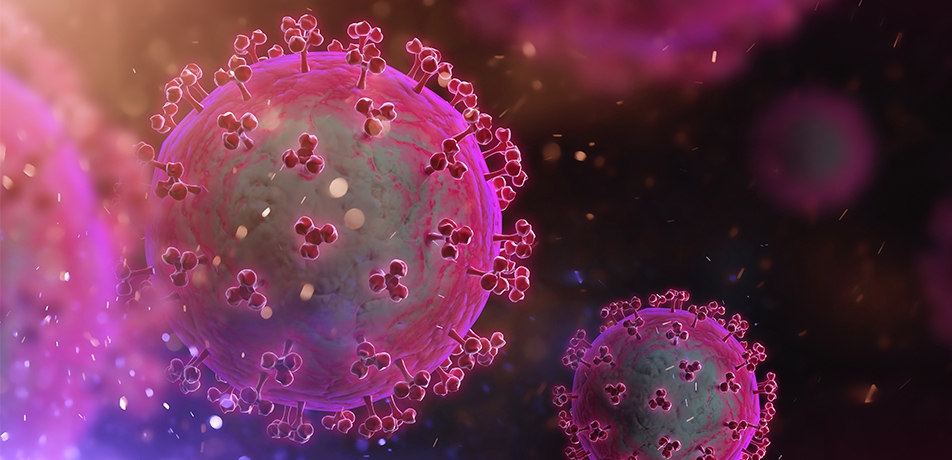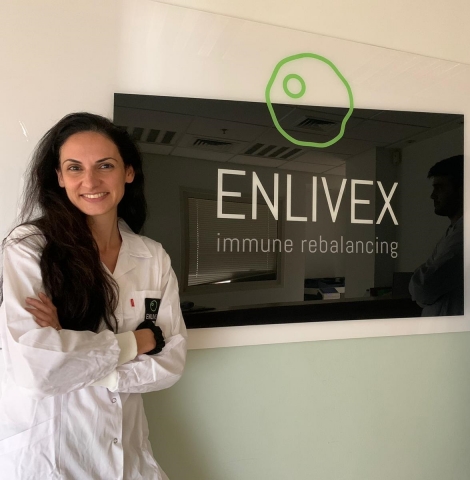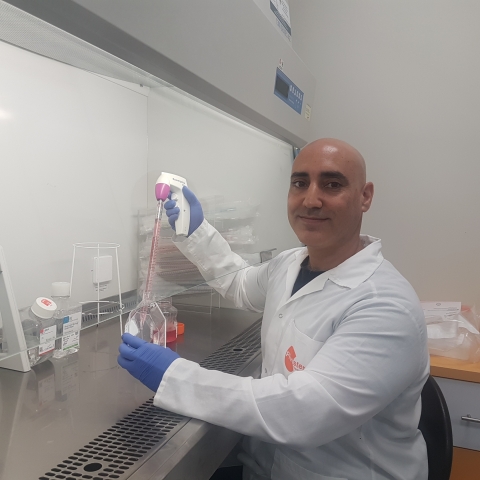Weizmann alumni take on COVID-19
In biotech, progress on key drugs and vaccines
Alumni

The world transformed in 2020. In a matter of months, COVID-19, the infectious disease caused by the novel coronavirus, SARS-CoV-2, brought the world to its knees, infecting millions and killing hundreds of thousands of people. Despite various strategies and efforts to slow the spread of the disease, the number of cases are still rising in many parts of the globe.
Weizmann alumni in biotech companies in Israel and beyond are hard at work on possible solutions in the form of drugs and vaccines.
Successful clinical trials at Hadassah
Alumna Dr. Noga Alagem works as a medical associate in the Clinical Development Department at Kamada—the first company in the world to initiate clinical trials for a plasma-derived anti-SARS-CoV-2 immunoglobulin therapy. A phase I/II clinical study, which recruited a total of 12 patients with COVID-19 pneumonia, was successfully completed at Hadassah Medical Center, with 11 out of the 12 patients showing improved symptoms within 48 hours of treatment and subsequently getting discharged from the hospital within a few days.
Kamada specializes in developing and manufacturing therapeutics from human plasma. When the pandemic broke out, the company decided to develop a plasma-derived immunoglobulin therapy for COVID-19. Using its advanced purification technology, Kamada extracted and concentrated antibodies from plasma collected from recovered patients.
Immunoglobulin therapy, or “passive immunization,” involves transferring antibodies from recovered patients to infected individuals. The simplest form of treatment is infusing COVID-19 patients with donor plasma. Kamada developed an antibody purification process that took this immunoglobulin therapy and created a more effective product, by removing potential pathogens, pooling antibodies from many donors, and creating a uniform dosage.
Dr. Alagem was involved in planning clinical trials for this new antibody treatment. “I am proud to work at the first company in the world to have this type of product ready, and to be part of the effort to find an effective treatment for COVID-19,” she says.
Toward an oral vaccine
At Tel-Hai Academic College and Migal Galilee Research Institute, Dr. Itamar Yadid is working as a researcher and group leader to help develop an oral vaccine for COVID-19.
In 2016, Migal, in collaboration with the Israeli Veterinary Institute, began developing a vaccine for a different strain of coronavirus called the infectious bronchitis virus (IBV)—a coronavirus that infects chickens. Recognizing the similarities between IBV and COVID-19, Migal established a specialized company, MigVax, to focus on developing a vaccine for SARS-CoV-2. Using the existing knowledge and research setup for the IBV vaccine, Dr. Yadid and other Migal researchers are designing an oral vaccine for COVID-19 that utilizes a chimeric protein to generate three kinds of immunological responses simultaneously—mucosal, blood-based, and cell-mediated immunity. This triple-armed approach provides comprehensive protection against infection, by preventing detrimental immune responses and allowing for the complete eradication of the invading virus.
Dr. Yadid discovered the fascinating and diverse world of enzymes and synthetic biology as a PhD student in Prof. Dan Tawfik’s lab in the Department of Biomolecular Sciences. “My time at Weizmann gave me an extensive education in protein engineering and production,” says Dr. Yadid. “It gave me the tools I needed to develop screening methods and automated procedures, which are essential in my current work at Migal.”
While he works on developing a vaccine to prevent future infections, three other Weizmann alumni, Dr. Veronique Amor, Dr. Gilad Kunis, and Dr. Noga Alagem are hard at work on potential drug treatments for infected patients.
Quelling the cytokine storm
Dr. Veronique Amor is Head of Development at Enlivex, a clinical-stage company that develops and commercializes cell therapies that rebalance the immune system.
When a foreign entity enters the blood stream, the immune system releases alert signals and specialized cells to neutralize the threat. Once the infection is defeated, a healthy immune system should return to a normal, balanced state. However, a number of viral, bacterial, and fungal infections can trigger an overreaction of the immune system, called a “cytokine storm,” which causes the immune system to spiral out of control and attack healthy tissues. It is now well understood that many coronavirus patients experience a cytokine storm, which can lead to severe complications such as organ damage, multiple organ failure, and death—and has led to the deaths of many coronavirus patients.
Enlivex is developing a potential therapeutic, Allocetra-OTS, to treat organ failure due to exaggerated immune responses and cytokine storms in septic patients. By harnessing the activity of early apoptotic cells, Allocetra-OTS signals the immune system to react less aggressively, thereby resetting the system towards homeostasis. Earlier this month, Enlivex reported that five coronavirus patients treated in Hadassah Hospital in an initial clinical trial of their product were released within 5-8 days after their condition improved and they tested negative for the virus.
This treatment could potentially offer a novel and holistic solution to the hyperimmune responses observed in severe COVID-19 patients, and as clinical trials progress, Dr. Amor and the development team will continue to improve the manufacturing process of Allocetra-OTS.
Dr. Amor earned her MSc in 2010 and her PhD in 2015 in the Department of Molecular Cell Biology under Prof. Elior Peles. She credits her expertise in assessing and implementing new technologies at Enlivex to her time spent at Weizmann.
“There is not a day that goes by that I don’t think of my time at the Institute,” Dr. Amor says. “Weizmann gave me the opportunity to learn from the best in the life sciences fields. It taught me how to manage my time and set priorities, how to carefully build a study, critically analyze data, and logically organize and present results.”
Working on yet another therapy being developed to mitigate the overactivation of the immune system, Dr. Gilad Kunis, a research scientist at Pluristem Therapeutics, is studying the effects of placenta-derived cells on the immune system. These cells, called PLX cells, are mesenchymal-like stromal cells, with regenerative and immunomodulatory properties, that induce the immune system’s natural regulatory mechanisms, preventing its over-activation.
Pluristem has initiated a phase 2 clinical trial for severe COVID-19 patients—as they run a higher risk of developing cytokine storms—enrolling 140 individuals in the U.S. and 40 patients in Israel and Germany.
Parallel to these clinical trials, Pluristem also treats COVID-19 patients in the U.S. and Israel through Compassionate Use programs, which stipulates that a new, unapproved drug can be used to treat a seriously ill patient when no other treatments are available. The first American to be treated with Pluristem’s PLX-PAD therapy was Edward Pierce, the Broadway designer whose recovery made headlines and was lauded as a “miracle”—as he went from being critically ill to leaving the hospital in short order.
As a PhD student on Prof. Michal Schwartz’s team in the Department of Neuroscience, Dr. Kunis studied how immune cells could be harnessed to support the central nervous system and treat neurodegenerative diseases such as Alzheimer’s disease and ALS.
“In Prof. Schwartz’s lab at the Weizmann Institute, we were always looking at the big picture to see how things work systemically and how they could be realistically applied—a mindset that has been very useful in how I study the PLX cells at Pluristem. Now that we are in advanced clinical trials with our PLX cells product candidates, I can see the application of the science, which is really exciting.”

Dr. Veronique Amor

Dr. Gilad Kunis